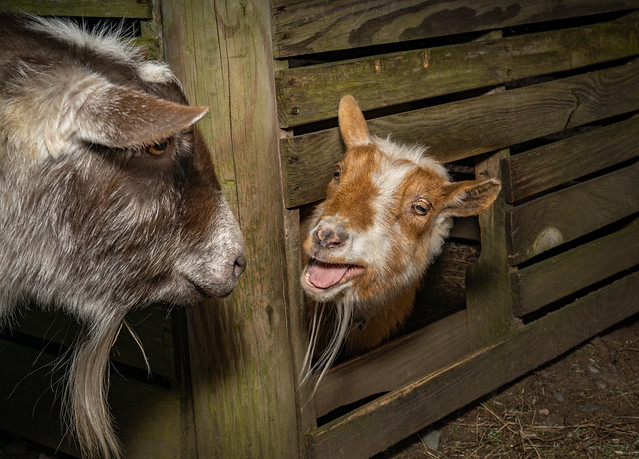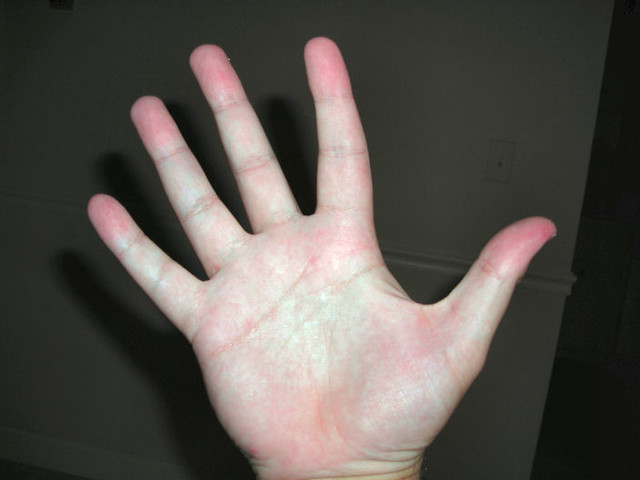Words for talkative, to speak, to sing and related things in Celtic languages.
Words marked with a * are reconstructions.
| Proto-Celtic | *ɸlabros = talkative *amɸlabros = dumb, mute |
|---|---|
| Gaulish | lab(a)ro- = talkative, eloquent, sonorous, speaker – appears in the names Labarus and Labrios |
| Old Irish (Goídelc) | labar = talkative, boastful labraithir = to talk, speak amlabar = dumb, mute |
| Middle Irish (Gaoidhealg) | labar = talkative, arrogant, boastful labraithir = to talk, speak labarthach = talkative, noisy labra = gift of speech, talkativeness, utterance, sound, speaking labraithir = to speak, talk, utter, say amlabar = dumb, mute |
| Irish (Gaeilge) | labhair = to speak, hail labhairt = speaking, speech, utterance, voice, call labharthacch = talkative, vociferous, noisy labharthacht = talkativeness labhra = speech, utterance amhlabhra = inarticulateness, bad delivery amhlabhrach = crude of speech, inarticulate |
| Scottish Gaelic (Gàidhlig) | labhair [l̪ˠau.ɪrʲ] = to speak, say, talk, speak!, utter! labhar = speaking loudly, loquacious, boastful labhairt = speaking, uttering, utterance labhairteach = loquacious, oral labhairte = said, spoken amhlabhair = mute, dumb, speechless (obsolete) co-labhairt = conference, symposium neach-labhairt = speaker, spokesperson ro-labhairt = prologue |
| Manx (Gaelg) | loayr = to speak, extemporise loayreyder = mouthpiece, speaker, talker loayrt = to speak, talk, utter, express loayrit = oral, spoken amloayrtagh = dumb, mute |
| Proto-Brythonic | *laβar [laβaːr] = prone to talking, eloquent *aβ̃laβar = dumb, mute |
| Middle Welsh (Kymraec) | llawar, llavar, llauar = loud, clear, vociferous lleueir, llauarei, llafaraf = to speak, say, tell aflauar = mute, dumb, speechless, silent |
| Welsh (Cymraeg) | llafar [ˈɬa(ː)var] = loud, clear, vociferous, resounding, resonant, sonorous; pertaining to the voice, vocal (of music, in contrast with instrumental); talkative, loquacious; spoken (language), oral, verbal llafarder = talkativeness, loquaciousness llafaredig = spoken, uttered, oral, verbal, articulate llafareiddio = to make more colloquial, speak naturally llafariad = vowel llefaru = to speak, say, tell, declare lleferydd = speech, voice, expression, uttereance, pronunciation aflafar [avˈlavar] = mute, dumb, speechless, silent |
| Old Cornish | lauar = talkative aflauar = dumb, mute |
| Middle Cornish (Cernewec) | lavar = utterance, speech, voice, a saying, word, proverb lavary = to speak, say, tell, pronounce, declare avlavar, afavar = speechless, dumb, mute |
| Cornish (Kernewek) | lavar = expression, idiom, utterance, sentence lavaren = phrase amlavar = dumb, mute leverel, lawl = to pronounce, say, tell leveryans = pronunciation avlavar = dumb |
| Old Breton | labar = talkative |
| Middle Breton (Brezonec) | lauaret = to say, promise |
| Breton (Brezhoneg) | lavar [ˈlɑːvar] = to say, word, language lavaradenn – to tell lavarenn [laˈvɑːrɛn] = proposal lavaret = to say, promise lavariant = communicative lavariantiz = communication amlavar = dumb, mute |
Etymology: possibly from Proto-Indo-European *pl̥b-ró-s, from *pleb- (to babble), which is also the root of words such as barbarian in English, pleurer (to cry) in French, and llorar (to cry, weep) in Spanish [Wiktionary].
| Old Irish (Goídelc) | asbeir [asˈbʲerʲ] = to say, utter, mention, speak |
|---|---|
| Middle Irish (Gaoidhealg) | atbeir = to say, speak |
| Irish (Gaeilge) | abair [ˈabˠəɾʲ] = to say, utter, speak, express, state, allege, give opinion, suppose, assume, mean, direct, report abairt sentence, phrase abartha given to repartee |
| Scottish Gaelic (Gàidhlig) | abair [abɪrʲ] = to say, speak, utter, tell abairt [abər̪ˠʃdʲ] expression, phrase, collocation, saying, comment abartach [abər̪ˠʃdəx] talkative, bold. impudent |
| Manx (Gaelg) | abbyr = to say, state, assume abbyrt = sentence, dialect, phrase, expression, period |
Etymology: from the Proto-Celtic *ess (ex-, out) and *beirid (to carry, bring, bear, give) [source].
| Proto-Celtic | *kaneti = to sing *kantlom = singing *toɸareuɸokaneti = to prophesize |
|---|---|
| Old Irish (Goídelc) | canaid = to chant, praise, recite, sing, speak cainnt [kan͈ʲtʲ] = speech, talk, conversation; act of speaking |
| Middle Irish (Gaoidhealg) | canaid = to sing, recite, chant canamain = singing, chanting cantain = singing, reciting, chanting, uttering cainnt = speach, talk, conversation, act of speaking cainntech = talkative, loquacious |
| Irish (Gaeilge) | can [kan̪ˠ/kanˠ] = to chant, sing, speak, talk, call, name canadh [kan̪ˠə/ˈkanˠuː] = singing, chanting cantaire = chanter, chorister caint [kan̠ʲtʲ / kəin̠ʲtʲ] = speech, talking cainteach = talkative, chatty cainteoir = speaker, talker caintigh = to speak, address, accost |
| Scottish Gaelic (Gàidhlig) | can [kan] = (to) say cainnt [kãĩn̠ʲdʲ] = to speak, talk, commune cainnteach [kãĩn̠ʲdʲəx] = loquacious, talkative cainnteanas [kãĩn̠ʲdʲənəs] = speech cainntear [kãĩn̠ʲdʲər] = orator, speaker cainntearachd [kãĩn̠ʲdʲərəxg] = eloquence, rhetorical expression cainnteas [kãĩn̠ʲdʲəs] = attractive speech cànan [kaːnan] = language cànanachas = linguistics cànanaiche = linguist |
| Manx (Gaelg) | caaynt = spoken language, spoken word, talk caayntagh = loquacious |
| Proto-Brythonic | *kėnɨd [ke̝ˈnɨːd] = to sing |
| Old Welsh | canam = to sing |
| Middle Welsh (Kymraec) | kan, cân = song kanu, canu = to sing kantor, kantoryeit = singer, songster, vocalist, musician, cantor kanwr, kantoryeit = singer, vocalist ynganv = to speak, talk, say |
| Welsh (Cymraeg) | cân [kaːn] = song canaf, canu [ˈkanɨ̞/ˈka(ː)ni] to sing; to intone, chant, to state, say, to produce musical sounds, to play (the harp, piano, etc), to compose poetry, to celebrate in song cantor, cantores = singer, vocalist, musician, cantor canwr = singer, vocalist ynganu = to speak, talk, say, tell, declare, express, pronounce |
| Middle Cornish (Cernewec) | can = song canas = song cane, cana = to sing (a song), to sing as birds, to crow canor, canores = singer |
| Cornish (Kernewek) | kan = poem, song kana [‘kana / ‘kɒnɐ] = to sing kaner, kanores = singer kanik = ditty, jingle |
| Middle Breton (Brezonec) | can = song canaff = to sing caner = singer |
| Breton (Brezhoneg) | kan [ˈkãːn] = song kanadeg = concert, cantata kanañ [ˈkãː.nã] = to sing kanaouenn [kã.ˈnɔ.wːɛn] = song kaner [ˈkãː.nɛr] = singer |
Etymology: from the Proto-Indo-European *keh₂n- (to sing) [source]. The English words accent, cant, chant, charm, enchant, hen and incantation come from the same root, as does the Breton word kentel (lesson, moral), the French word chanter (to sing), and the Spanish word cantar (to sing) [source].
| Proto-Celtic | *kom-wep-s- = conversation |
|---|---|
| Welsh (Cymraeg) | comio = to talk converse ymgom = (subject of) chat or conversation ymgomiad = chat, conversatoin, talk, dispute, debate ymgomio, ymgoniaf = to chat, converse, mention, discuss, dispute, debate ymgomiol = chatty, conversational, colloquial ymgomiwr = conversationalist, talker, speaker |
| Middle Cornish (Cernewec) | cews, cowms, cows = speech, discourse, talk cewsel, cowsa = to speak, say, tell, relate cows = to speak, say, tell cowses = a speech, discourse |
| Cornish (Kernewek) | kows [kɔʊz] = to speak, talk kewsel [ˈkɛʊzɛl] = to speak, talk |
| Middle Breton | comps = speech, to say, tell, pronounce |
| Breton (Brezhoneg) | komz [ˈkɔ̃ms] = to speak, talk, express oneself komzapl = expressible komzer = speaker komzerzh = expression komzidigezh = speech komzus = expressive |
Etymology: from Proto-Celtic *kom- (with) and *wepos (speech, voice), from Proto-Indo-European *wekʷ- (to speak), which is also the root of epic, vocal, voice and vowel in English [source].
| Proto-Celtic | *kom-wep-s- = conversation |
|---|---|
| Old Irish (Goídelc) | comrád = conversation, dialogue, talking |
| Middle Irish (Gaoidhealg) | comrád. comrad = conversing, talking, dialogue, speech, utterance, saying comráidid = to converse comráitech = chatty, talkative |
| Irish (Gaeilge) | comhrá [ˈkoːɾˠɑː/ˈkõːɾˠɑ̃] = conversation comhráiteach = conversationalist, conversational |
| Scottish Gaelic (Gàidhlig) | còmhradh [kɔ̃ːrəɣ] = conversing, conversatoin, dialogue, discussion, negotiation |
| Manx (Gaelg) | cowag = babble, chat |
Etymology: from Old Irish com- (mutual, joint, co-) and rád (speech, talk, conversation), from Proto-Celtic *kom- (with) and *rādīti, from *rādī (to talk) [source].
Sources: Wiktionary, Am Faclair Beag, Online Manx Dictionary, Teanglann.ie, eDIL – Electronic Dictionary of the Irish Language, In Dúil Bélrai English – Old Irish glossary, Geiriadur Prifysgol Cymru, Gerlyver Kernewek, Dictionaire Favereau, TermOfis, English – ProtoCeltic WordList (PDF), Etymological Dictionary Of Proto Celtic












